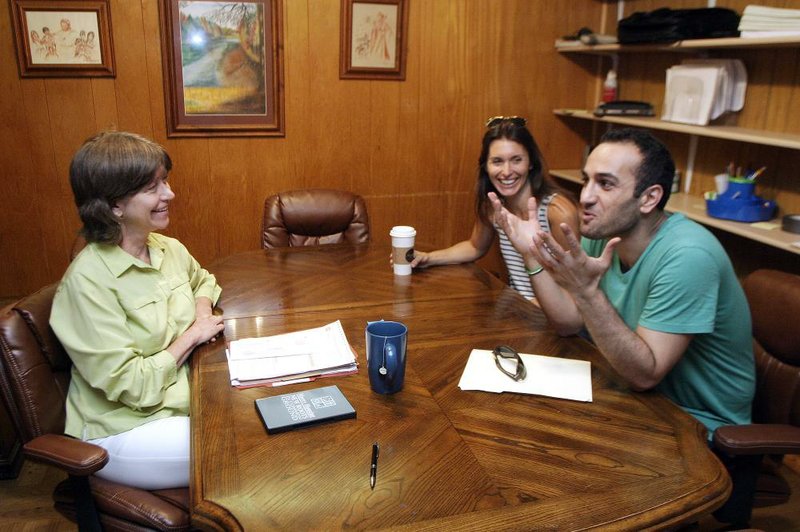FAYETTEVILLE — A Syrian activist plans to continue helping with the uprising in his home country from his new home in Fayetteville, where he moved this month.
Omar al-Muqdad, 32, a journalist and opposition activist who lived for eight months as a refugee in Turkey, was allowed to leave that country June 4.
Al-Muqdad picked Fayetteville as his destination after he met Mohja Kahf at a conference in Turkey last year. Kahf is a poet, author and associate professor of English at the University of Arkansas in Fayetteville.
“Mohja really sold him on the university, the greenery, the peace, and that’s all he’s talked about since he landed here,” said Sara Bishop, volunteer coordinator for refugee resettlement for St. Joseph Catholic Church inFayetteville.
Al-Muqdad is a familiar face to television viewers in the Middle East. He has appeared on television newscastsand in documentary films, including the BBC’s Panorama: Syria Inside the Secret Revolution. He also has been a freelance journalist for several newspapers in the Middle East and a regular correspondent for CNN in Istanbul.
Al-Muqdad said he covered the “massacre” thatbegan in his hometown of Daraa 16 months ago and spread across the country. Since then, he has continued reporting on the activities of the military under Syria’s President Bashar Assad.
“I became known,” al-Muqdad said. “My face was all the time on TV.”
The catalyst for the movement that began in March 2011 was the arrest and reported torture of children for scrawling anti-government graffiti on a school building in Daraa, according to the BBC documentary. The uprising quickly spread to cities across Syria and was met with force from the military.
The United Nations estimates that more than 10,000 people, mostly civilians, have been killed since the uprising began. The Assad government has repeatedly referred to the people fighting the regime as armed terrorist gangs. Russia has been Assad’s staunchest ally during the conflict.
Al-Muqdad serves as a conduit for citizen journalists in Syria who film attacksin that country with small cameras and e-mail the digital video to him.
Al-Muqdad said he receives two to 10 videos every day from people filming developments in Syria. He decides which videos should be posted online on YouTube.com and which should go to CNN. He usually writes a description to go along with the videos.
“With the Internet, I can reach anyone I want to talk to,” said al-Muqdad. “There are a lot of people doing the same thing as what I do.”
Al-Muqdad received a political science degree from Damascus University in Syria in 2004.
Bishop said al-Muqdad spent a week with a host family in Fayetteville before moving into his own apartment. He’ll stay rent-free for two months thanks to a donor, she said.
Catholic Charities of Arkansas gave him a bicycle, but al-Muqdad has already bought a car, a 2006 Ford Taurus. Now he’s studying to take the test to get an Arkansas driver’s license.
Rebecca Bryant, a refugee resettlement specialist for Catholic Charities of Arkansas, said between 200 and 250 refugees live in Arkansas, and about one-third of them were resettled in the state through Catholic Charities, which has an office in Springdale. A refugee is a person who has fled his home country because of a fear of persecution.
Most of the refugees in Arkansas came here because they had family living in the state. Bryant said she started a “free-case program” in the fall for refugees who had no family or friends in Arkansas.
St. Joseph Catholic Church is a partner in that effort. Last fall, Catholic Charities and St. Joseph helped a family of refugees from Bhutan settle in Arkansas. After a few months, they moved to Minnesota, but they may return to Arkansas, Bryant said.
Northwest Arkansas, Pages 7 on 06/19/2012

